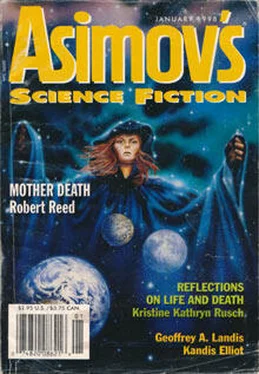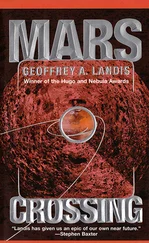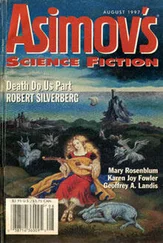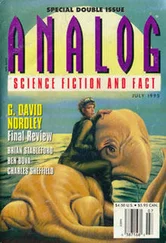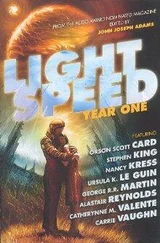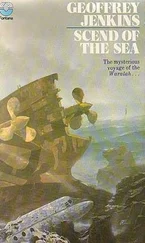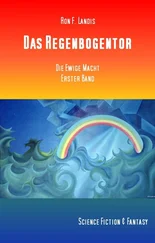The first thing I do is fire my engine to stop my orbit. I crack the throttle to fifty million gees of acceleration, and the burn takes nearly a second, a veritable eternity, to slow my flight.
For a moment I hover, and start to drop. I dare not drop too fast, and I ramp my throttle up, to a hundred megagee, five hundred, a billion gravities. At forty billion gravities of acceleration, my engine thrust equals the gravity of the black hole, and I hover.
The blackness has now swallowed half of the universe. Everything beneath me is black. Between the black below and the starry sky above, a spectacularly bright line exactly bisects the sky. I have reached the altitude at which orbital velocity is just equal to the speed of light, and the light from my rocket exhaust is in orbit around the black hole. The line I see around the sky is my view of my own rocket, seen by light that has traveled all the way around the black hole. All I can see is the exhaust, far brighter than anything else in the sky.
The second brightest thing is the laser beacon from the wormhole station above me, shifted from the original red laser color to a greenish blue. The laser marks the exact line between the station and the black hole, and I maneuver carefully until I am directly beneath the orbiting station.
At forty billion gravities, even my ultrastrong body is at its limits. I cannot move, and even my smallest finger is pressed against the form-fitting acceleration couch. But the controls, hardware-interfaced to my brain, do not require me to lift a finger to command the spacecraft. The command I give Huis Clos is: down.
My engine throttles down slightly, and I drop inward from the photon sphere, the bright line of my exhaust vanishes. Every stray photon from my drive is now sucked downward.
Now my view of the universe has changed. The black hole has become the universe around me, and the universe itself, all the galaxies and stars and the wormhole station, is a shrinking sphere of sparkling dust above me.
Sixty billion gravities. Seventy. Eighty.
Eighty billion gravities is full throttle. I am burning fuel at an incredible rate, and only barely hold steady. I am still twenty kilometers above the horizon.
There is an unbreakable law of physics: incredible accelerations require incredible fuel consumption. Even though my spaceship is, by mass, comprised mostly of fuel, I can maintain less than a millisecond worth of thrust at this acceleration. I cut my engine and drop.
It will not be long now. This is my last chance to uplink a copy of my mind back to the wormhole station to wake in your body, with my last memory the decision to upload my mind.
I do not.
The stars are blueshifted by a factor of two, which does not make them noticeably bluer. Now that I have stopped accelerating, the starlight is falling into the hole along with me, and the stars do not blueshift any further. My instruments probe the vacuum around me. The theorists say that the vacuum close to the horizon of a black hole is an exotic vacuum, abristle with secret energy. Only a ship plunging through the event horizon would be able to measure this. I do, recording the results carefully on my ship’s on-board recorders, since it is now far too late to send anything back by radio.
There is no sign to mark the event horizon, and there is no indication at all when I cross it. If it were not for my computer, there would be no way for me to tell that I have passed the point of no return.
Nothing is different. I look around the tiny cabin, and can see no change. The blackness below me continues to grow, but is otherwise not changed. The outside universe continues to shrink above me; the brightness beginning to concentrate into a belt around the edge of the glowing sphere of stars, but this is only an effect of my motion. The only difference is that I have only a few hundred microseconds left.
From the viewpoint of the outside world, the light from my spacecraft has slowed down and stopped at the horizon. But I have far outstripped my lagging image, and am falling toward the center at incredible speed. At the exact center is the singularity, far smaller than an atom, a mathematical point of infinite gravity and infinite mystery.
Whoever I am, whether or not I survive, I am now the first person to penetrate the event horizon of a black hole. That’s worth a cheer, even with nobody to hear. Now I have to count on the hope that the microsecond timing of the technicians above me had been perfect for the second part of my intricate dance, the part that might, if all goes well, allow me to survive.
Above me, according to theory, the stars have already burned out, and even the most miserly red dwarf has sputtered the last of its hydrogen fuel and grown cold. The universe has already ended, and the stars have gone out. I still see a steady glow of starlight from the universe above me, but this is fossil light, light that has been falling down into the black hole with me for eons, trapped in the infinitely stretched time of the black hole.
For me, time has rotated into space, and space into time. Nothing feels different to me, but I cannot avoid the singularity at the center of the black hole any more than I can avoid the future. Unless, that is, I have a trick.
Of course, I have a trick.
At the center of the spherical universe above me is a dot of bright blue-violet; the fossil light of the laser beacon from the orbiting station. My reaction jets have kept on adjusting my trajectory to keep me centered in the guidance beam, so I am directly below the station. Anything dropped from the station will, if everything works right, drop directly on the path I follow.
I am approaching close to the center now, and the tidal forces stretching my body are creeping swiftly toward a billion gees per millimeter. Much higher, and even my tremendously strong body will be ripped to spaghetti. There are only microseconds left for me. It is time.
I hammer my engine, full throttle. Far away, and long ago, my friends at the wormhole station above dropped a wormhole into the event horizon. If their timing was perfect—
From a universe that has already died, the wormhole cometh.
Even with my enhanced time sense, things happen fast. The laser beacon blinks out, and the wormhole sweeps down around me like the vengeance of God, far faster than I can react. The sparkle-filled sphere of the universe blinks out like a light, and the black hole—and the tidal forces stretching my body—abruptly disappears. For a single instant I see a black disk below me, and then the wormhole rotates, twists, stretches, and then silently vanishes.
Ripped apart by the black hole.
My ship is vibrating like a bell from the abrupt release of tidal stretching. “I did it,” I shout. “It worked! God damn it, it really worked!”
This was what was predicted by the theorists, that I would be able to pass through the wormhole before it was shredded by the singularity at the center. The other possibility, that the singularity itself, infinitesimally small and infinitely powerful, might follow me through the wormhole, was laughed at by everyone who had any claim to understand wormhole physics. This time, the theorists were right.
But where am I?
There should be congratulations pouring into my radio by now, teams of friends and technicians swarming over to greet me, cheering and shouting.
“Huis Clos,” I say, over the radio. “I made it! Huis Clos here. Is anybody there?”
In theory, I should have reemerged at Wolf-562. But I do not see it. In fact, what I see is not recognizably the universe at all.
There are no stars.
Instead of stars, the sky is filled with lines, parallel lines of white light by the uncountable thousands. Dominating the sky, where the star Wolf-562 should have been, is a glowing red cylinder, perfectly straight, stretching to infinity in both directions.
Читать дальше
